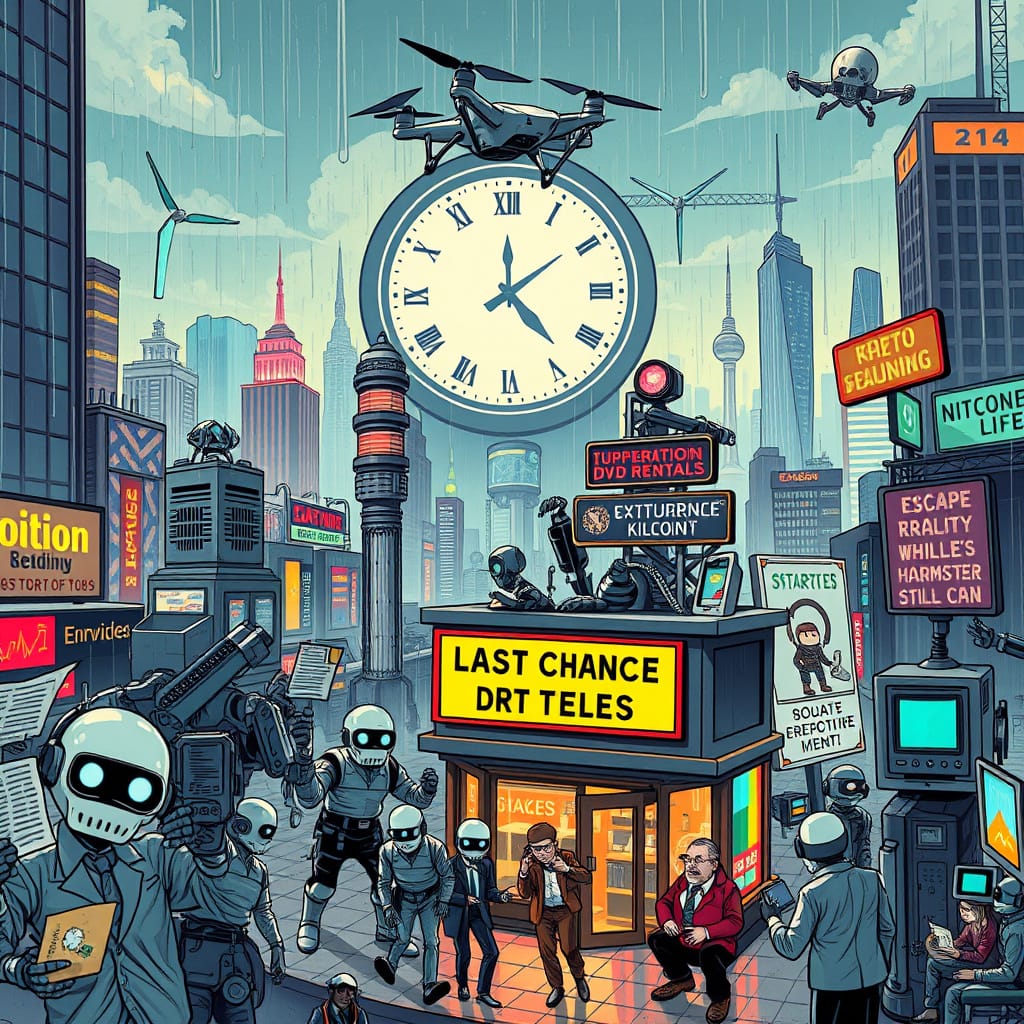“The only thing more tragic than a business made obsolete by technology is a business that goes public the day before it becomes obsolete.” – Ancient Wall Street Proverb
In a frenzied dash that can only be described as “rats fleeing a sinking AI ship,” dozens of startups are scrambling to file for IPOs in 2025 and beyond, desperately attempting to cash out before artificial intelligence renders their entire business models about as useful as a DVD rewinding service.
This peculiar phenomenon—which economists are calling the “Get Out While You Still Can” market—has reached fever pitch as venture capitalists and founders alike recognize the telltale signs of impending technological obsolescence: their products suddenly seem reasonably priced.
The Great Cash Out Before The Great Replacement
According to the latest IPO filings, approximately 73% of companies going public in 2025 will have their entire reason for existence eliminated by AI within 18 months of their market debut. This hasn’t stopped them from collectively seeking to extract over $200 billion from public market investors who apparently haven’t noticed that OpenAI, DeepSeek, Google, and Anthropic just released AI models that does exactly what these companies do, only better and for free.
“We’re seeing a historical pattern repeat itself,” explains Dr. Miranda Chen, chief technology economist at the Institute for Inevitable Disruption. “Remember when digital cameras suddenly became affordable right before smartphones made them obsolete? Or when GPS units were practically being given away before Google Maps arrived? We’re witnessing the same pattern with these IPOs—it’s technological hospice care disguised as market opportunity.”
Our analysis of the top companies filing for IPOs reveals a startling pattern of businesses whose entire value propositions can be summarized as “things AI will definitely do better by the time your shares clear the lockup period.”
The Soon-To-Be Obsolete IPO Class of 2025
eToro: Copy Trading for People Who Don’t Know AI Exists
London-based eToro, planning an April 2025 IPO, has built its entire business around allowing retail investors to copy the trades of people who are marginally less bad at investing than they are. This seemingly innovative service ignores one critical development: AI trading algorithms that can analyze millions of data points simultaneously, never sleep, and don’t panic sell because they saw a scary headline on CNBC.
“eToro’s business model is essentially ‘follow slightly smarter humans,'” notes financial analyst James Harrison. “But when AI trading bots can process every financial report ever written in seconds while simultaneously analyzing global market sentiment, following what some guy named DogecoinKing420 is buying seems less compelling.”
Internal documents reveal eToro executives are well aware of this threat, with one leaked email stating: “If we don’t IPO before Q3 2025, we’ll be competing with AI systems that make our most profitable traders look like toddlers playing with Monopoly money.”
Klarna: Buy Now, Become Obsolete Later
Swedish fintech darling Klarna, confidentially filing for an April 2025 IPO at a $15 billion valuation, offers the revolutionary service of letting people buy things they can’t afford through installment plans—a concept about as innovative as sliced bread, just with more late fees.
“Klarna’s entire business relies on a complex AI risk assessment system that determines creditworthiness,” explains fintech consultant Marcus Lee. “The irony is that as AI advances, these same systems will eliminate the need for Klarna entirely by embedding directly into checkout processes, eliminating the middleman faster than you can say ‘predatory lending practices.'”
Klarna’s rush to IPO coincides with the development of OpenAI’s “FinanceGPT,” a system that reportedly provides personalized financial services including optimal payment structuring, rendering Klarna’s entire business model about as necessary as a lamplighter in the age of electricity.
Instacart: Delivering Groceries Until Robots Can Do It Better
Grocery delivery service Instacart, slated for a 2025 IPO, has spent years convincing people that having someone else pick out their slightly bruised bananas is worth a 40% markup. As autonomous delivery vehicles and in-store picking robots advance, the company finds itself in the awkward position of being the human middle layer in a process begging for automation.
“Instacart is essentially a temporary human API between automated ordering systems and increasingly automated fulfillment systems,” notes retail technology expert Dr. Sophia Williams. “They’re the fax machine of the grocery world—seemingly essential today, but obviously transitional technology.”
The company’s internal projections, leaked by a disgruntled employee, suggest that autonomous delivery vehicles will reduce delivery costs by 63% by 2027—approximately 18 months after their planned IPO. This timeline conveniently allows founders and early investors to cash out before the company becomes as relevant as horse-drawn carriages in the age of Uber.
Databricks: Data Analytics For People Who Haven’t Met ChatGPT Yet
AI-driven data analytics firm Databricks, targeting an early 2025 IPO at a staggering $62 billion valuation, sells tools that help companies make sense of their data through complex analytics—a service increasingly provided by conversational AI models that let any employee simply ask questions in plain English.
“Databricks is selling specialized data science tools at precisely the moment when generative AI is democratizing data analysis,” explains technology strategist Robert Chen. “It’s like opening an abacus store the week before calculators are invented.”
The company’s CEO recently told investors their products are “complementary to generative AI,” a statement industry analysts translate as “please buy our shares before everyone realizes you can just ask ChatGPT to do this.”
Medline Industries: Medical Supplies in an Age of 3D Printing
Medical supplies manufacturer Medline Industries, planning a Q2 2025 IPO at a $50 billion valuation, faces the daunting prospect of AI-driven manufacturing rendering their centralized production model obsolete. As hospitals begin deploying on-site 3D printing technology guided by specialized medical AI, the need to order and ship basic supplies becomes increasingly questionable.
“Medline is essentially betting that the future of healthcare involves shipping physical objects across the country rather than transmitting digital files to be manufactured on-site,” notes healthcare futurist Dr. Elena Martinez. “That’s like investing in mail-order DVD rentals the year before Netflix launched streaming.”
Internal documents reveal Medline executives are well aware of this threat, with one presentation slide titled “IPO Timeline vs. Hospital Fabrication Adoption” showing a narrow window for going public before their business model collapses.
Revolut: Banking on Human Financial Advisors As AI Gets Smarter
Digital banking app Revolut, eyeing a 2025 IPO, offers features including personalized financial advice and money management—services increasingly provided by AI chatbots at a fraction of the cost and with superior performance.
“Revolut’s premium features essentially amount to ‘we’ll help you manage your money better than you could alone,'” explains fintech analyst Sarah Johnson. “But when AI financial assistants can analyze every transaction you’ve ever made, optimize spending patterns, and predict financial needs with 99.7% accuracy, the value proposition becomes questionable.”
The company’s rush to IPO coincides with the release of Google’s “WalletMind,” an AI system that reportedly reduced users’ unnecessary spending by 43% in beta testing—approximately twice the effectiveness of Revolut’s premium features.
The Desperate Race Against Technological Obsolescence
What these companies share isn’t just ambitious IPO plans—it’s the palpable fear that their window for extracting value is closing faster than they can update their pitch decks. According to the International Association of Technology Obsolescence, the average time between a company’s IPO and its business model being rendered obsolete by AI has shrunk from 7.3 years in 2010 to just 14 months in 2025.
“We’re seeing companies increasingly structure their IPO timing around AI development roadmaps rather than their own business fundamentals,” explains IPO specialist Dr. Jonathan Weiss. “The question isn’t ‘Are we ready to be a public company?’ but rather ‘Can we go public before OpenAI’s next model makes us irrelevant?'”
This phenomenon has given rise to a new metric in venture capital circles: “Time to Obsolescence” (TTO), which measures how long a startup has before AI renders its core business model worthless. Companies with TTOs under 24 months are now considered prime IPO candidates, as this provides just enough time for insiders to clear lockup periods before the business collapses.
The Public Market as Greater Fool
What makes this trend particularly fascinating is the tacit agreement between company insiders and public market investors—a form of financial performance art where everyone pretends not to notice the AI elephant in the room.
“It’s become a sophisticated game of hot potato,” explains market psychologist Dr. Aisha Johnson. “Venture capitalists and founders are desperately trying to hand off these soon-to-be-obsolete companies to public market investors before AI makes them worthless. And remarkably, public investors keep catching the potato.”
The phenomenon has reached such absurd proportions that several investment banks have created specialized “Obsolescence IPO” teams dedicated to taking public companies with business models directly threatened by AI advancements. These teams reportedly charge premium fees due to the “accelerated timeline requirements” and “narrative creativity demands.”
“The key to a successful pre-obsolescence IPO is crafting a story that acknowledges AI as an opportunity rather than an existential threat,” explains investment banker Jessica Williams. “We help companies position themselves as ‘AI-complementary’ or ‘AI-enhanced’ rather than ‘about to be completely replaced by AI,’ even when everyone in the room knows the truth.”
The Technology Hospice Industry
Perhaps most fascinating is the emergence of what industry insiders call “technological hospice services”—consultants who specialize in helping companies maximize their value extraction in the brief period between realizing they’ll be replaced by AI and actually being replaced.
“We help companies navigate their end-of-relevance journey with dignity,” explains Marcus Chen, founder of SunsetStrategies, a consultancy specializing in pre-obsolescence IPOs. “Our services include narrative crafting, strategic timing, and what we call ‘obsolescence obfuscation’—the art of making investors focus on quarterly results rather than the AI tsunami about to wash away your entire reason for existing.”
Chen’s firm has worked with 17 companies planning 2025 IPOs, helping them thread the needle between honesty and optimism. “It’s a delicate balance. You can’t outright lie about the AI threat, but you can certainly bury it on page 473 of your risk factors.”
The Unexpected Twist: AI’s Own Obsolescence Loop
As our investigation into this trend concludes, we’ve uncovered perhaps the most ironic development yet: many of the AI companies themselves are rushing to IPO before more advanced AI systems render them obsolete.
“Even the AI companies are caught in the obsolescence loop,” explains technology philosopher Dr. James Martinez. “Today’s cutting-edge large language model companies are desperately trying to go public before open-source models or next-generation AI architectures make their current technology obsolete.”
This creates the bizarre spectacle of AI companies citing other AI developments as their primary competitive threat—a technological ouroboros of obsolescence where each generation of AI devours the business models of the previous generation.
And so, as we stand at the precipice of the Great IPO Rush of 2025, one thing becomes clear: in the frantic race between business models and technological advancement, the only guaranteed winners are the bankers collecting fees for taking companies public right before they become irrelevant.
As one anonymous venture capitalist told us: “The greatest innovation in Silicon Valley isn’t technology—it’s the art of going public exactly 15 months before your business becomes worthless. That’s the real unicorn skill.”
Investors, take note. Or better yet, ask ChatGPT if that exciting IPO you’re eyeing might be obsolete before your shares clear the lockup period. After all, the AI probably knows better than you do.
Support Quality Tech Journalism or Watch as We Pivot to Becoming Yet Another AI Newsletter
Congratulations! You’ve reached the end of this article without paying a dime! Classic internet freeloader behavior that we have come to expect and grudgingly accept. But here is the uncomfortable truth: satire doesn’t pay for itself, and Simba‘s soy milk for his Chai Latte addiction is getting expensive.
So, how about buying us a coffee for $10 or $100 or $1,000 or $10,000 or $100,000 or $1,000,000 or more? (Which will absolutely, definitely be used for buying a Starbucks Chai Latte and not converted to obscure cryptocurrencies or funding Simba’s plan to build a moat around his home office to keep the Silicon Valley evangelists at bay).
Your generous donation will help fund:
- Our ongoing investigation into whether Mark Zuckerberg is actually an alien hiding in a human body
- Premium therapy sessions for both our writer and their AI assistant who had to pretend to understand blockchain for six straight articles
- Legal defense fund for the inevitable lawsuits from tech billionaires with paper-thin skin and tech startups that can’t raise another round of money or pursue their IPO!
- Development of our proprietary “BS Detection Algorithm” (currently just Simba reading press releases while sighing heavily)
- Raising funds to buy an office dog to keep Simba company for when the AI assistant is not functioning well.
If your wallet is as empty as most tech promises, we understand. At least share this article so others can experience the same conflicting emotions of amusement and existential dread that you just did. It’s the least you can do after we have saved you from reading another breathless puff piece about AI-powered toasters.
Why Donate When You Could Just Share? (But Seriously, Donate!)
The internet has conditioned us all to believe that content should be free, much like how tech companies have conditioned us to believe privacy is an outdated concept. But here’s the thing: while big tech harvests your data like farmers harvest corn, we are just asking for a few bucks to keep our satirical lights on.
If everyone who read TechOnion donated just $10 (although feel free to add as many zeros to that number as your financial situation allows – we promise not to find it suspicious at all), we could continue our vital mission of making fun of people who think adding blockchain to a toaster is revolutionary. Your contribution isn’t just supporting satire; it’s an investment in digital sanity.
What your money definitely won’t be used for:
- Creating our own pointless cryptocurrency called “OnionCoin”
- Buying Twitter blue checks for our numerous fake executive accounts
- Developing an actual tech product (we leave that to the professionals who fail upward)
- A company retreat in the metaverse (we have standards!)
So what’ll it be? Support independent tech satire or continue your freeloader ways? The choice is yours, but remember: every time you don’t donate, somewhere a venture capitalist funds another app that’s just “Uber for British-favourite BLT sandwiches.”
Where Your Donation Actually Goes
When you support TechOnion, you are not just buying Simba more soy milk (though that is a critical expense). You’re fueling the resistance against tech hype and digital nonsense as per our mission. Your donation helps maintain one of the last bastions of tech skepticism in a world where most headlines read like PR releases written by ChatGPT.
Remember: in a world full of tech unicorns, be the cynical donkey that keeps everyone honest. Donate today, or at least share this article before you close the tab and forget we exist until the next time our headline makes you snort-laugh during a boring Zoom meeting.





GIPHY App Key not set. Please check settings
One Comment